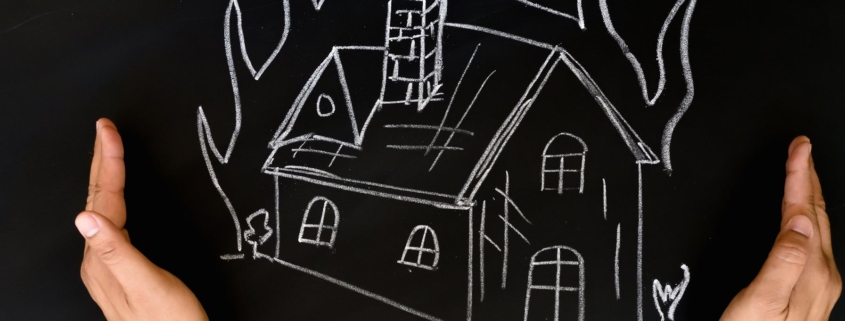Fire Safety Tips For Homeowners
When you’re a homeowner, your home should feel like the ultimate place of safety and security. But sometimes, accidents can happen. House fires in particular can always pose a dangerous threat. According to the National Fire Protection Association (NFPA), an average of 358,500 homes experience a structural fire each year, and FEMA reports that more than 3,000 Americans are killed in fires annually.
You might think that taking the normal baseline precautions are enough but remember that even a small fire can spread within minutes. Beyond that, it can take more time to escape your home than you think. Take a look at these fire safety tips to help prevent a fire and stay safe in the event of an emergency.
Cooking
FEMA also reports that the top three causes of fires in homes are cooking, heating equipment, and electrical malfunction. When cooking especially, there are a few simple safety steps to be mindful of in the kitchen:
- Ensure that the burners and stove are always turned off when you are finished cooking
- Be especially careful when cooking or frying with oil and grease
- Make sure that all clothing and other combustible materials stay far away from open flames
Additionally, you can take preventative action with our fire detection systems, which can alert you when burners are remained on.
Heating
Any risks with your home’s heating system will change depending on your own specific situation. If you use conventional gas heating, it’s a good idea to have annual inspections to ensure everything is working properly. Plus, you want to check for any gas leaks and the potential risks of carbon monoxide poisoning.
Other factors to consider include:
- Make sure there are at least 3 feet of clearance between space heaters and any flammable objects
- Ensure wood-burning heaters and fireplaces are properly maintained and cleaned on a regular basis
- Always check the wiring on any electronic heaters to make sure there is no damage
Watch your Candles
Candle safety seems like a no-brainer, but you can never be too careful! When using candles, be smart about their placement. Never leave an open flame unattended or near children. Extinguish candles before leaving the room or going to sleep.
Appliances and Furniture
Be aware of the way that you choose to decorate and furnish your home. In general, furniture can catch fire very quickly. Take special care with placing furniture near heat sources. Electrical malfunctions account for about 6% of residential building fires. It is important to check electrical cords and to replace them if they are damaged, especially if you’re using outlets that are near your furniture or curtains.
Utilize Smoke Detectors
Smoke detectors are one of the best ways to prevent house fires. But, they’re pretty useless if you don’t know if they even work. Ensuring that your smoke detectors are working properly is a huge part of ensuring your safety. Check that you have a smoke detector in every room in which people sleep and outside of the sleeping area. Test the detector once a month by pushing the test button until it beeps. If your smoke detector needs a new battery or is malfunctioning, take care of it as soon as possible. Smoke detectors older than 10 years need to be replaced and batteries older than six months should be changed as well. If you ever hear the fire alarm, it is important that you immediately leave your home.
Invest in Fire Extinguishers
In the event that a fire does occur, you should be prepared to handle it. Fire extinguishers are easy to store in the kitchen to help contain any small accidental outbreaks. Make sure that you purchase one. Only one in four Americans have a fire extinguisher in their household, but it’s truly a necessary item to stop minor fires before they spread. Ensure that the fire extinguisher is up to date and working properly. Familiarize yourself with PASS (Pull, Aim, Squeeze, Sweep) on how to properly use a fire extinguisher.
Develop an Escape Plan
Aside from fire prevention, it’s always important to know what to do should the worst occur. If you find yourself in the midst of an active house fire, you don’t want to panic and make a mistake. Creating a fire escape plan is very important and will allow you to be ready in case a fire ever does occur. Identify all possible escape routes from your home and establish a meeting place outside, a safe distance from your house, with your family. Conduct your own fire drills, both during the day and at night, so you’re never caught off guard in an emergency.
For More Home Security Tips and Solutions, Stick with Boyd & Associates
At Boyd & Associates, monitored CO and fire prevention systems are linked to our central monitoring. That means we can summon appropriate help when an alarm goes off, whether you are home or not, even if the security alarm is not armed. Monitoring is especially important in cases where occupants are not capable of responding appropriately to a traditional alarm. Such as the elderly or disabled individuals, children, individuals already overcome by the effects of CO or smoke, and pets in an otherwise empty house. Firefighters recommend placing one monitored smoke/CO detector in every bedroom and living space.
And if you’re looking for more ways to keep yourself and your family safe, check out our home security and automation services at Boyd & Associates. We offer a wide range of home security options to protect you and your family. If you’re ready to discuss our custom solutions, contact us today to learn more about our services and how we can help you prepare for what’s next.
- Smart Security for Tax Season: How to Protect Your Personal Data - February 18, 2026
- Top Security Trends to Watch in 2026 — And How They Protect Your Home or Business - January 24, 2026
- Gift Guide: Smart Home Upgrades That Actually Matter - December 15, 2025



